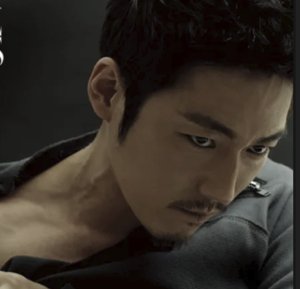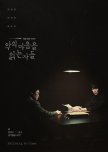Through The Darkness Comes Light
I loved that this drama focused on the profiling techniques to identify and help capture vicious criminals, and the heavy weight and darkness the profilers carry with them. Kim Nam Gil had me deep in my emotions. I can hardly imagine how it must be to live day in and day out with the viciousness of the crimes we've witnessed in this show in real life -- the secondary stress, compassion fatigue, burnout, post-traumatic stress, and everything else in between. As someone once said, the expectation that one can be immersed in suffering and loss daily and not be touched by it is as unrealistic as expecting to walk through water and not get wet. Ha Young reaching that burnout point and wanting to escape the darkness is only natural, but wanting and actually being able are two completely different things. Kim Nam Gil and this drama make all the other current dramas pale by comparison.
Just like how I enjoyed the depth Kim Nam Gil brings to his role as Song Ha Young. I loved the passion Kim So Jin brings to Tae Goo. A top-notch police officer disregarded her for her gender. The more I watched Through the Darkness, the more respect I gained for Kwon Il Yong as the first ever South Korean criminal profiler, and for pouring his all into looking inside the hearts of monstrous criminals at the time when the term criminal profiling and the idea of serial killers was nonexistent. And what I like more is that the drama focuses more on those who chase serial killers, rather than the serial killers themselves. I liked that the drama was unapologetic in its realistic depiction of the events at that time, the overt contempt and ingrained prejudices of male police officers at all levels towards their female counterparts even more than I did the serial killings, and I abhorred those. I understand the behavior is reflective of the times, and despite it having gotten somewhat better, the sad truth is that the battle between feminism and deep-seated misogyny continues to this day and is perpetuated by historical practices. I love that this drama doesn't shy away, nor skims through the dark issues.
What affected me most as I watched the events of this drama unfold is how Kook Young Soo, Yoon Tae Goo, Jung Woo Joo, Reporter Choi Yoon Ji, and particularly Song Ha Young struggled to come to terms with the senseless abuses and murders each case and interview brought to the forefront. I would be remiss not to mention Kim Nam Gil's brilliance in the role of a man and police officer who feels too much, so much so that he distances himself from everyone as a way to cope. There were many scenes that touched me deeply, and in particular the scenes where the team desperately searched for a murdered child's missing fingers. When Ha Young wishes in his sleep, he could've puffed her killer away before he committed the most atrocious act against. What I like most about Ha Young is that he doesn't fit nor does he try to fit. And the more I watched the drama, the more I realize that serial deviant behavior flows from a hard heart. One choice leads to many, many choices until the conscience is so hardened that the predators forget they even have one. and no longer in operation.
When one is fully immersed in a show 12 episodes seem so short. The end came a lot faster than I expected or wanted, and just when I started to get used to Ha Young's smiling face. I loved the rapport and camaraderie Song Ha Young, Kook Young Soo, and Jung Woo Joo persistently built together, helping each other through what may have seemed like endless darkness. They went from being marginalized for their grandiose ideas to becoming the most sought after criminal profilers. My biggest takeaway from this drama is that through the darkness comes light, through fear comes love, and through pain comes triumph, as someone once said. No doubt Kim Nam Gil, Jin Seon Kyu, Kim So Jin, Ryeoun and the many other brilliant and talented actors made it seem a lot simpler and sexier than in real life -- the true heroes are the likes of Kwon Il-yong, who encountered evil time and time again and persevered through it all. Kim Nam Gil in The Fiery Priest was awe-inspiring, so much so that I thought he wouldn't be able to top that role, but I was wrong. He did again, and I am sure he will do it again and again. A thousand and one kudos to those who penned, directed, and brought this profound drama to life -- a job beyond well done. Kim Nam Gil definitely leaves a void, and I pray this is not the end, but the beginning of many seasons to come.
Just like how I enjoyed the depth Kim Nam Gil brings to his role as Song Ha Young. I loved the passion Kim So Jin brings to Tae Goo. A top-notch police officer disregarded her for her gender. The more I watched Through the Darkness, the more respect I gained for Kwon Il Yong as the first ever South Korean criminal profiler, and for pouring his all into looking inside the hearts of monstrous criminals at the time when the term criminal profiling and the idea of serial killers was nonexistent. And what I like more is that the drama focuses more on those who chase serial killers, rather than the serial killers themselves. I liked that the drama was unapologetic in its realistic depiction of the events at that time, the overt contempt and ingrained prejudices of male police officers at all levels towards their female counterparts even more than I did the serial killings, and I abhorred those. I understand the behavior is reflective of the times, and despite it having gotten somewhat better, the sad truth is that the battle between feminism and deep-seated misogyny continues to this day and is perpetuated by historical practices. I love that this drama doesn't shy away, nor skims through the dark issues.
What affected me most as I watched the events of this drama unfold is how Kook Young Soo, Yoon Tae Goo, Jung Woo Joo, Reporter Choi Yoon Ji, and particularly Song Ha Young struggled to come to terms with the senseless abuses and murders each case and interview brought to the forefront. I would be remiss not to mention Kim Nam Gil's brilliance in the role of a man and police officer who feels too much, so much so that he distances himself from everyone as a way to cope. There were many scenes that touched me deeply, and in particular the scenes where the team desperately searched for a murdered child's missing fingers. When Ha Young wishes in his sleep, he could've puffed her killer away before he committed the most atrocious act against. What I like most about Ha Young is that he doesn't fit nor does he try to fit. And the more I watched the drama, the more I realize that serial deviant behavior flows from a hard heart. One choice leads to many, many choices until the conscience is so hardened that the predators forget they even have one. and no longer in operation.
When one is fully immersed in a show 12 episodes seem so short. The end came a lot faster than I expected or wanted, and just when I started to get used to Ha Young's smiling face. I loved the rapport and camaraderie Song Ha Young, Kook Young Soo, and Jung Woo Joo persistently built together, helping each other through what may have seemed like endless darkness. They went from being marginalized for their grandiose ideas to becoming the most sought after criminal profilers. My biggest takeaway from this drama is that through the darkness comes light, through fear comes love, and through pain comes triumph, as someone once said. No doubt Kim Nam Gil, Jin Seon Kyu, Kim So Jin, Ryeoun and the many other brilliant and talented actors made it seem a lot simpler and sexier than in real life -- the true heroes are the likes of Kwon Il-yong, who encountered evil time and time again and persevered through it all. Kim Nam Gil in The Fiery Priest was awe-inspiring, so much so that I thought he wouldn't be able to top that role, but I was wrong. He did again, and I am sure he will do it again and again. A thousand and one kudos to those who penned, directed, and brought this profound drama to life -- a job beyond well done. Kim Nam Gil definitely leaves a void, and I pray this is not the end, but the beginning of many seasons to come.
Questa recensione ti è stata utile?


 2
2






















